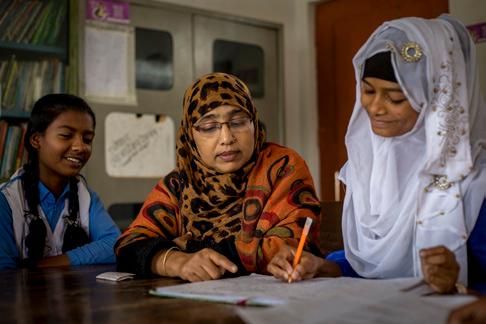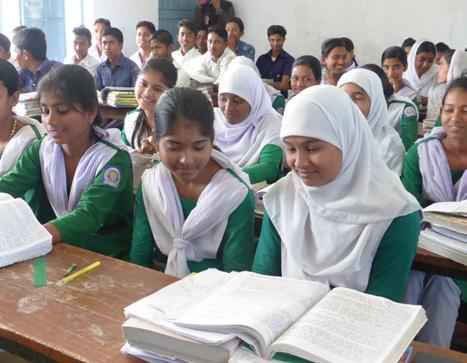
8 minute read
Ritu: the impact
the impact
The specific goal of the Ritu programme was the improved health and well-being of girls in Bangladesh. With the randomised controlled trial, Simavi, BNPS, and DORP worked with Maastricht University to measure the effects of the direct interventions in schools and communities in Netrokona on general health and well-being, and more specifically well-being during menstruation of girls in Netrokona.
Advertisement

Overall health and well-being
The Ritu programme, as well as the interventions in Netrokona, specifically focused on health and well-being during menstruation. In our ToC development, we assumed that this would have an effect on overall health and well-being. We measured overall health and well-being through a mental health index and a subjective well-being index. The RCT did not show any significant treatment effect on these indexes of either interventions package. It worth mentioning that a topic such as general well-being might be difficult to self-report on by young girls. At the same time, baseline levels of self-reported well-being were already high in the control group. Note: In this report we only publish a selection
of the findings of the Ritu RCT and provide limited details on the analysis of the findings. An academic impact paper, written by Lidwien Sol, Eleonora Nillesen, and Paul Smeets will be published with the complete analysis of the Ritu RCT. These are the preliminary findings and might slightly change as a result of further analysis.
Improved physical health during menstruation
Not having the right knowledge and skills, or access to products and gender-sensitive toilets, and restrictions stemming from menstrual stigma, influence girls’ ability to perform menstrual practices and maintain the necessary hygiene standards. This is likely to have an effect on their physical health. However, there is not yet conclusive evidence to support this.
From the RCT data, we did not find any reduction in the physical health of girls. We asked girls about the incidence of skin rashes or irritations and found no difference between girls that received the Ritu school or school plus community intervention compared to the control group. It is worth mentioning that physical health can be complicated to measure, so taking this in consideration the findings are not surprising.

Improved well-being during menstruation
In addition to health, the Ritu programme aimed to improve girls’ well-being during menstruation.
To measure well-being, we used indicators of psychosocial well-being and girls’ confidence to perform menstrual practices (among others).
We find strong evidence that the interventions successfully increased psychosocial outcomes as well as confidence during the menstrual period. To measure this, we asked girls how often they feel embarrassed or insecure during their menstruation.
Feeling embarrassed With a score of 3.3, girls in the control group already scored high on the scale of 1 (always) to 4 (never). The Ritu programme still had a positive effect on levels of embarrassment. Both the girls that received the school interventions and the girls that received school plus community interventions report significant lower levels of embarrassment during their menstruation (3.4 and 3.5 respectively). In terms of insecurity, at 3.37 the control group again scored high.
Feeling insecure The school interventions did not impact levels of
insecurity. However, with a score of 3.6 girls that received the school plus community interventions showed significantly less insecurity. We can conclude from this that the additional community interventions created a more supportive environment in which girls felt less insecure during their menstruation.

Sadiya Afrin Jeli (15-year-old girl) ‘‘Before the Ritu programme I knew very little about menstruation. I used to worry a lot, but felt embarrassed to talk about it. My mother was the only one with whom I talked about it, but very little. There was so much I didn’t know! I also used to miss school during menstruation because I felt uncomfortable using the toilets. Things changed when the Ritu programme came to our school. Teachers started talking to us about menstruation. I joined the student forum where I received more information about menstrual health. This increased my knowledge about menstruation and made me much more confident to talk about it. Now I openly discuss menstrual issues with my parents, brothers, and sisters as well as my teachers. The toilets at my school are now cleaned regularly and there is running water, soap, and a bin. In general, I worry a lot less during my periods. All this also helps me to focus on my studies. I haven’t been absent from school because of my menstruation lately.’ Confidence Feeling confident is an important aspect of wellbeing. In the Ritu programme we measured girls’ confidence in managing their menstruation when at home and when at school, as recent evidence 14 suggests that being confident to manage menstruation in one environment (eg. at home) does not naturally translate to feeling confident in a different setting (e.g. at school or at work). At the baseline level, girls generally expressed more confidence managing their menstruation at home than at school. Both treatments increased confidence levels in the school environment, but only the school and community component increased the confidence levels in the home environment. The results suggest that Ritu had a significant and positive impact on the subjective well-being of girls during their menstruation.
As a result of the school intervention, girls’ confidence in managing their menstruation at school increased by 12%. There was no significant effect on confidence at home (which was already very high). The school and community intervention increased confidence at school by 15% and confidence at home by 4% compared to control communities.
Increased school attendance
Missing school days and/or school drop-out is often brought up as an argument to invest in menstrual health. At the same time, reduced school absence and drop-out are often quoted as outcomes of menstrual health programmes.
This is relevant, as girls’ education is associated with long-term benefits such as increased health, delayed marriage, and greater well-being for the household. 15 Although menstruation is not the only and, according to our baseline, not the main reason for girls to miss school days, it is one of the reasons for school absence. This means that menstrual health interventions could positively contribute to school attendance and possibly drop-out. Moreover, the overall goal of Ritu was to improve the social and economic participation of girls in Bangladesh. For girls in the age range 10–15, attending school is a prime indicator of social participation.
The Ritu programme needs assessment identified the lack of appropriate WASH facilities and the acceptance based on norms restricting girls’ movement during menstruation as reasons for girls’ absenteeism. Through initial mapping exercises in communities, Simavi also found that parents had understood from awareness-raising sessions outside the Ritu programme that it was better to keep girls at home during menstruation.
It was therefore decided to include positive messaging towards girls’ school attendance in awareness-raising activities by BNPS, DORP, and RedOrange.
Based on the findings of the three different methods to collect school data (the endline survey, on-the-spot checks and administrative school records) we find strong evidence that the Ritu programme resulted in increased school attendance among girls in intervention schools. The RCT data shows that absence of girls who ‘Because of the researchers our work has reached a higher received the Ritu school intervention reduced by 20.9% compared to the control group. We see a reduction of 13.5% in absence rates of girls who quality level.’ received both the school and the community interventions. The difference between the two Hilda Alberda, Programme Manager Ritu, interventions is not statistically significant. Simavi Headquarters With the RCT, we did not only contribute SRHR related impact to the evidence base on menstrual health As part of the RCT, we asked girls about a programming. We also learned a lot from number of sexual and reproductive health (SRHR) our collaboration with the researchers topics. We did this following the assumption that connected to the programme. Based on menstrual health is a foundation issue of SRHR. their advice, we decided to limited the Despite the relatively short intervention period variety of interventions and use evidence to and relatively young age of girls (13 on average select those that were most likely to achieve at endline), we see a consistent positive effect the expected impact. This enabled us to of the programme (not tested for significance). really invest in and monitor the quality of One of the questions we asked girls was if they each intervention. Moreover, the results can had been pregnant. Of the girls that received the now more easily be linked to specific interschool intervention or the school plus community ventions and we have a simple model that intervention, 0,2% (4 girls) responded positive can be scaled-up in different contexts. to this question. In the control group, this was 0,6% (6 girls). When asked about marriage, 1,7% An academic paper will be published on of girls in the intervention areas confirmed to be the RCT by L. Sol et al. that will contain a married compared to 3,3% in the control group. more extensive overview and analysis of the measures. ‘I now realise why girls should attend school regularly.’


Mr Ajharul Islam, Head Teacher, Hazi Foize Uddin High School ‘Before the Ritu project, whenever a girl came to me with a leave application, I used to sigh because I understood the reason. However, I never realised the importance of regular attendance, and never tried to take any initiative to support my students. The Ritu programme has opened my eyes. I realise why girls should attend school regularly. In my school, now there are separate toilets for girl students. There is a small grocery shop near my school where I have instructed them to keep sanitary pads that girls can buy throughout the year.’







